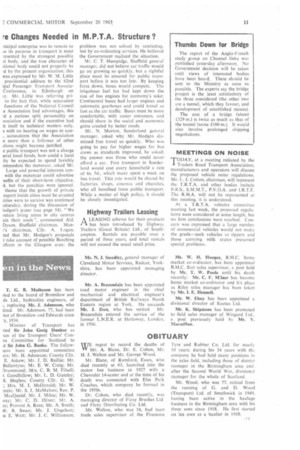re Changes Needed in M.P.T.A. Structure ?
Page 13

If you've noticed an error in this article please click here to report it so we can fix it.
;nicipal enterprise was to remain to its purpose in transport it must resented by the strongest possible ii body, and the true character of ttional body could not properly be ;d by the present organization; this was expressed by Mr. W. M. Little presidential address to the 62nd ipal Passenger Transport AssociaConference, in Edinburgh on ty. Mr. Little was referring prito the fact that, while separation functions of the National Council e Association had advantages, this :d a curious split personality on ;sociation and if the executive had it itself to technical matters only, s with no bearing on wages or con, accusations that the Association o more than a follower of other etions might become justified.
e public transport was not a charge teral local funds, how could a local ity be expected to spend lavishly Drrimo-da te the motorcar, asked Mr. Large and powerful interests conwith the motorcar could advertise nefits of their short-term objective, d, but the penalties were ignored. theme that. the growth of private nsport inside cities must be arrested cities were to survive was continued Anesday, during the discussion of todgen's paper (see page 54). 'We retain living areas in city centres sin their souls", commented Aid. Dyson. Sheffield chairman. Manr's chairman, alr. A. Logan, ted that Mr. Hodgen's proposals
t take account of possible Beeching ..:ffects in the Glasgow area; the
problem was not solved by restricting, but by co-ordinating services, He believed the Government realized the situation, Mr. C. T. Humpidge, Sheffield general manager, did not believe car traffic would go on growing so quickly, but a rightful place must be ensured for public transport before it was too late. By keeping fares down, buses would compete. The iniquitous fuel tax had kept down the Size of bus engines for economy's sake: Continental buses had larger engines and automatic gearboxes and could travel as fast as the car traffic. Buses must be mom comfortable, with easier entrances, and should share in the social and economic gains created by better roads.
Mr. N. Morton, Sunderland general manager, asked why Mr. Hodgen dismissed free travel so quickly. Who was going to pay for higher wages for bus crews as standards improved, he asked; the answer was those who could never afford a car. Free transport in Sunderland would cost every household a rate of 65. 5d., which many spent a week on bus travel. This rate would be shared by factories, shops, cinemas and churches, who all benefited from public transport. While a matter of high policy, it should be closely investigated,
Highway Trailers Leasing
A LEASING scheme for their products ti. has been introduced by Highway Trailers (Great Britain) Ltd., of Southampton. Rentals are payable over a period of three years, and total rentals will not exceed the usual retail price.
• Mr. N. J. Smedley, general manager of Cleveland Motor Services, Redcar, Yorkshire, has been appointed managing director.
Mr. A. Brazendale has been appointed road motor engineer in the chief mechanical and electrical engineer's department of British Railways North Eastern region at York. lie succeeds Mr. J. Don, who has retired. Mr. Brazendale entered the service of the former L.N.E.R. at Holloway, London, in 1936. MEETINGS ON NOISE TODAY, at a meeting initiated by the I Traders Road Transport Association, manufacturers and operators will discuss the proposed vehicle noise regulations. Mr. L. J. Cotton, chairman, will represent the T.R.T.A. and other bodies include B.R.S., S.M.M.T., P.V.O.A. and I.R.T.E. The R.H.A. will not be represented at this meeting, it is understood.
At a T.R.T.A. vehicles committee meeting last week, the proposed regulations were considered at some length, but no firm conclusions were reached. Concern was expressed that a large number of commercial vehicles would not make the grade—such vehicles as tippers and those carrying milk crates presented special problems.
Mr. W. H. Hooper, B.M.C. home market co-ordinator, has been appointed B.M.C. fleet sales supervisor, a post held by Mr. T. W. Poole until his death recently.' Mr. C. F. Milner has become home market co-ordinator and h:s place as Riley sales manager has been taken by Mr. I. E. Henna.
Mr. W. Elsey has been appointed a divisional director of Rootes Ltd.
Mr. K. Shipstone has been promoted to field sales manager of Wingard Ltd.. a post previously held by Mr. V. Macmillan.




















































































































